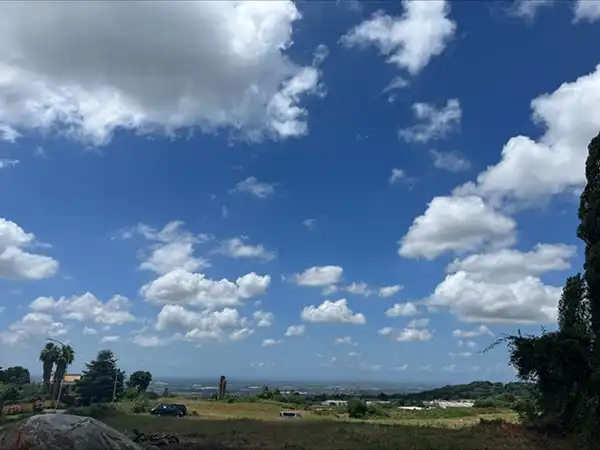Astonishing Archaeology in the Alban Hills (2023)
By: Nicole Miller
I remember sitting in math class when I received an email saying that I was the recipient of the David Mulroy Scholarship in Classics. I could barely contain my excitement! I knew that this experience was going to make my childhood dream come true. I have always dreamed of working on an archaeological site, but there was one thing in my way; and that was affording it. Receiving this scholarship has alleviated financial burdens and allowed me to fully immerse myself in the field of archaeology. I am beyond grateful for studying Classics at UWM because the Classics program gives students this incredible opportunity to study an amazing field fully funded.
I already had a few archaeology programs on my radar, but the deadline for them was quickly approaching. Dr. Cova and Dr. Wesolowski were so helpful in not only helping me find the right program, but they provided me with valuable tips to prepare for this journey. I applied to several programs, but after interviewing with Dr. Renner and Dr. Aryamontri from Montclair State in New Jersey, I knew this was the program for me. This program was an archaological field school of the Villa of the Antonines in Genzano di Roma, located in the astonishing Alban Hills (about 30 miles south of Rome). If you have ever seen the movie Gladiator, the emperor Commodus spent some time at this unbelievable villa.
I was lucky to have met someone from the program who was also from Wisconsin, so I had a travel buddy. With my work clothes and steel-toed boots, we left out of the Chicago airport and my adventure began. All of the other students in the program were so amazing, especially because we all had a common interest, Classical archeology. I quickly became friends with four other students who were from all over the United States. Long work days under the hot Italian sun, as well as living in close quarters in a hotel room will definitely connect you with your fellow classmates.
I fell in love with the typical work day. We started at 7:30 am and ended around 4:30 pm. We were bussed to the site (about a ten minute drive) and lunch was provided on site. I became very familiar with my personal trowell, as well as a pick axe. I had dirt in my nose, my mouth, my ears, but I had a smile on my face. I learned how to properly clean frescoes and tesserae, and I found many of them in the dirt. I also learned how to properly take pictures of artifacts as well as cataloging them in the lab. One of the coolest parts about this adventure was that I got to dig next to the most breathtaking mosaic I have ever layed eyes on, it was a depiction of Medusa with incredible designs surrounding her head. We were required to journal daily, and the more detailed your journal was the better. I was very specific in recording where I worked, what I found, what tools I used, and who I worked with. I also was sure to include many detailed drawings. The professors collected the journals at the end of the program for record.
We had the evenings and weekends to ourselves, where I enjoyed delicious Italian food and of course, gelato. I visited a different Italian city each weekend, which was filled with museums and sight seeing. I went to Rome, Florence, and explored the Alban Hills. When the program came to an end, I was so sad, but grateful at the same time for the experience of a lifetime. I will never forget the connections I made on this adventure, . I still keep in touch with some of the students I met! I learned so much about the methods of Roman Archaeology as well as the Italian culture, and I even picked up a bit of the beautiful language! Once again, I want to express my gratitude for the David Mulroy Scholarship and the donor. I think it is so amazing that the Classics program at UWM has this to offer students and I urge all Classics students to apply for this life-changing scholarship.
Fun in the Tuscan Sun (2022)
By Justin Gleesing
School is expensive. As the years go on anything related to college becomes more and more expensive. Unfortunately, this leads to people getting shut out of opportunities left and right. Because of this, I had no plans to do archaeological field schools after my first one in Wisconsin. The thought of doing one outside of the United States was a dream that I had thought had to stay a dream. It wasn’t until I received an email on one fated day that this all changed. If you haven’t guessed by now, the email was that I had received the David Mulroy Scholarship, which changed everything for me.
With this scholarship, my dream of doing another field school didn’t have to stay a dream. It afforded me the opportunity to do another field school more related to my classical studies. Upon reading the email, I was filled with both joy and gratitude for being part of such a wonderful department that can award its students life-changing scholarships. After receiving the scholarship, I began researching potential field schools I could take part that year. Once my research began, I found that the deadline for most of them was quickly approaching. It is here that I would like to give a special thanks to both Dr. Cova and Dr. Counts for assisting me in helping me find a program. After many exchanged emails and frantic decision-making, I decided to join the Poggio Civitate Archaeological Field School which is run by Dr. Anthony Tuck.
The archaeological school took place in central Tuscany, near Siena. Getting there was a journey which I could probably write a novella about, but I’ll spare you the details. I made it to the middle of nowhere and met the crew that I would be working with for the next six weeks. I didn’t know it at the time, but everyone that I worked with there became some of my closest friends. The bonds that you make while working underneath the unforgivable sun are something I think everyone needs to experience.
The six weeks that I was there were either spent practicing archaeology or learning about the site itself through lectures given by various professors. We learned a lot about the wonderful people of the past known to us as the Etruscans. One of the best parts of this trip was talking with the locals that lived near the site. They took great pride in the ancient Etruscans. We would share with them what we were learning about these people, and they would share with us their Italian culture.
The trip wasn’t all digging and learning though. We had our weekends and evenings off which were dedicated to hanging out with the people on the dig. This is where we all connected. The evenings were filled with laughter and unforgettable karaoke nights. The weekends afforded everyone the opportunity to travel wherever they wanted to go. Each weekend I tried to make it to a different city in Italy. During the six weeks that I was there, I managed to spend a weekend in Siena, Rome, and Florence. All of which were breathtaking in their own ways.
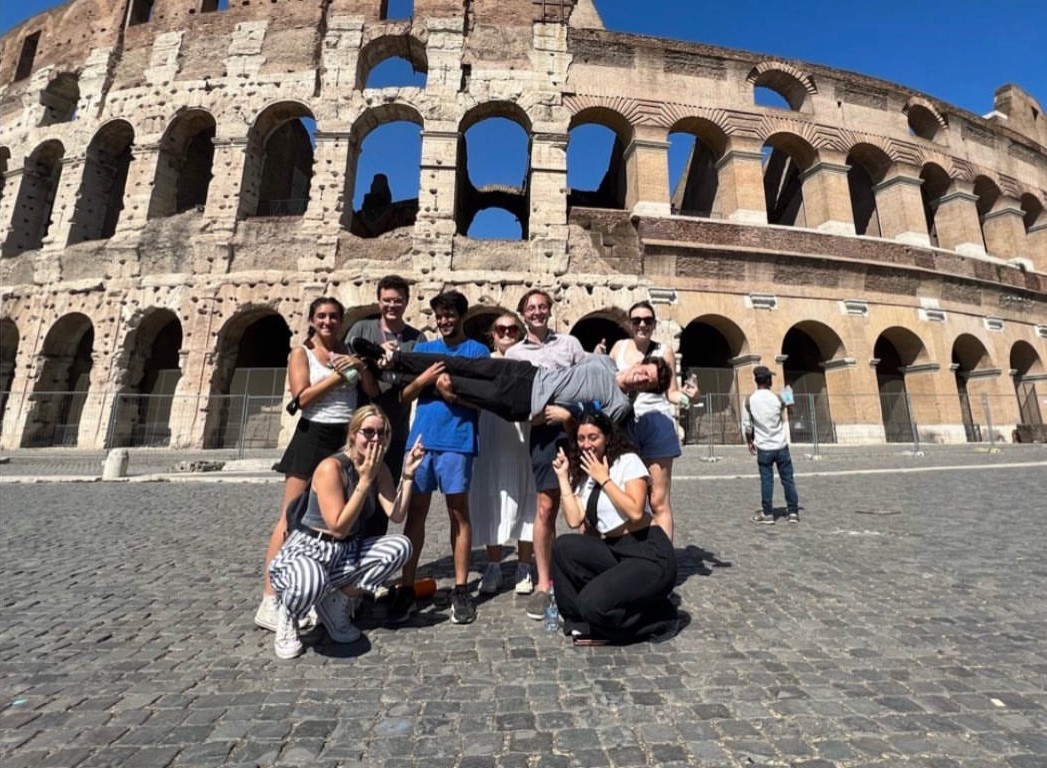
As quickly as it started, my journey in Italy came to an end. The goodbyes were as tough as they come. I miss the crew immensely but I’m thankful to each one of them for making my time in Italy special. The journey allowed me to grow greatly as a person. I was able to experience a culture completely different from my own and meet people that I would have otherwise never met. I can’t express enough gratitude to the David Mulroy Scholarship donor and the Classics department for affording me the opportunity to take this journey. The Classics department is full of wonderful hardworking people who do everything they can to provide students with the tools to succeed. If it is within your financial means I highly recommend you to go out there and do a study abroad program.
Summer in Rome (2022)
By Daniel Kennedy
Traveling abroad had always been a dream of mine, so in the Fall of 2019 when I heard about the David Mulroy scholarship I jumped at the chance to apply. I don’t think I truly thought I would be selected, so I was shocked when I received an email from Professor Mulroy himself, informing me that I would be receiving $10,000 to study abroad in Greece or Italy. While the pandemic almost prevented me from being able to utilize the scholarship money before graduating, this past summer, I was finally able to take advantage of the incredible opportunity I was given. Before saying anything else, I would just like to say that the program I selected was quite expensive, so I never would have even been able to consider it if not for the generosity of the Mulroy scholarship donor and the UWM Classics department.
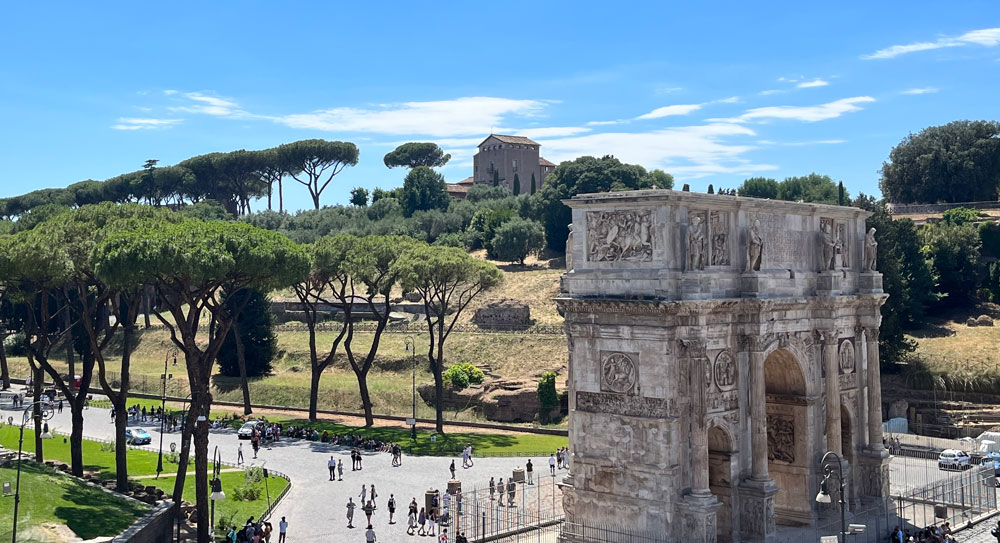 I ended up selecting a four-week program in Rome hosted by UCLA. It was led by UCLA professor Dr. Robert Gurval and consisted of a group of 22 students. We were housed in an apartment complex in Trastevere, one of the most beautiful neighborhoods in Rome. Monday through Friday, we had a mandatory morning and evening lecture. Each lecture took place at the actual site we were discussing that day. No lectures took place in a classroom. Over the course of the trip, we visited practically every major museum and ancient Roman site or monument in the city. However, it’s impossible to see everything that a city like Rome has to offer in a few weeks, so I’m still itching to go back to see and do the things I didn’t have the chance to on this trip.
I ended up selecting a four-week program in Rome hosted by UCLA. It was led by UCLA professor Dr. Robert Gurval and consisted of a group of 22 students. We were housed in an apartment complex in Trastevere, one of the most beautiful neighborhoods in Rome. Monday through Friday, we had a mandatory morning and evening lecture. Each lecture took place at the actual site we were discussing that day. No lectures took place in a classroom. Over the course of the trip, we visited practically every major museum and ancient Roman site or monument in the city. However, it’s impossible to see everything that a city like Rome has to offer in a few weeks, so I’m still itching to go back to see and do the things I didn’t have the chance to on this trip.
The academic portion of the trip was pretty light compared to some of the other study abroad programs I had looked into. In addition to the daily walks throughout the city, we were also responsible for completing ten journal entries and sketches pertaining to our personal experience, a twenty-minute group presentation on an ancient site, and two exams. But weekends and the time between lectures was our own. I became close friends with about five other students, and almost every night after the evening lecture, we would have dinner at a restaurant in whichever part of the city we were that day. We even went to a Måneskin concert at the Circus Maximus one weekend. After the trip to Pompeii during the third weekend of the trip, we were given three days to go wherever we wanted. I and six other students booked an Airbnb on the island of Ischia and from there took a day trip to Capri. Other groups of students spent a few days in Sorrento, Positano, and Florence.
I’d like to express my gratitude once again to the Mulroy Scholarship donor and the Classics department for granting me the opportunity of a lifetime. I would also like to specifically thank Professor Cova of the Classics department for all of her help over the two-and-a-half-year period from when I first received the scholarship to when I finally had the chance to use it this year. I can honestly say that this trip was one of the best experiences of my life and is something I will always cherish. In addition to having the opportunity to see with my own eyes the sites and works of art that have appeared throughout the courses of my undergraduate degree, I left Rome with a passion for international travel and a handful of very close friends.
When in Rome (2019)
By Justice Hernday
I never thought that I was going to be able to travel abroad, much less study abroad, until I received the David Mulroy scholarship. It was such an incredible honor to be chosen for the scholarship when this was its second year of being alive. Truth be told, I read the email in the break room at work and I just started crying. Many people were very confused, but they congratulated me as soon as I told them in between the hiccups. It was a very confusing night.
Anyway, I received the scholarship and, as much as I wanted to travel to Greece, I knew that I would probably survive a little easier in Italy – a little less octopus in the dishes there. Through UWM, I was able to apply to API – Academic Programs International – and head to John Cabot University in Rome, Italy for the summer semester. This is an American college that is pretty much in the heart of Rome, and I spent about six weeks baking in the Italian July sun. For a pale kid from Wisconsin, I was out of my temperature element. Through API, they set us up in an apartment a few blocks from the main campus building and every morning I walked to school, grabbing an iced coffee on the way. I can honestly say that I miss that small café with that small coffee. I took two classes at John Cabot, History of Rome and then a Shakespeare class. I could’ve taken an Italian class, which they offered both as a class or just general tutoring, but I could get by since a lot of Romans speak pretty decent English. Besides that, I could say a few general and polite phrases in Italian, so they at least knew I was trying. That’s what counts. You try. And be polite. With the Shakespeare class, we focused on plays that were Italian in nature – Julius Caesar, Titus Andronicus, Merchant of Venice, etc. – and we were situated pretty decently in the city to be able to walk to a few historical landmarks to solidify what we were reading. We visited a synagogue in the Jewish ghetto, La Torre Argentina – place where Julius Caesar was stabbed, except now it’s a cat sanctuary – to name a few. With the History class, we didn’t do any excursions, but it was fun to learn about places that I could literally walk to.
When I wasn’t in class, and not doing homework, API encouraged excursions from us, sometimes day trips and once a whole weekend. They took us to Narni, a small town in the mountains that inspired C.S. Lewis for The Chronicles of Narnia, and then they took us on a weekend trip to Sorrento, Capri, and then to Pompeii. Capri is a tiny island off the coast of Sorrento and, out of the group of about 15-20 of us, we could wander how we liked around the island. I spent a lot of time at the beach and I walked up to the main part of town – since the town is higher up than the coastal part of the island – and I could see for miles. Plus, I turned into a lobster. Seriously, I still have slight burn lines on my shoulders. Pompeii was also amazing to go to the next day because I had just learned about it from Prof. Cova’s class at UWM. We walked around a (small) part of the town and were able to go into the Forum and I could walk between buildings and name them. It’s an entirely different feeling to read about something in a class and then be able to go up to that same thing and touch it in real life. API really picked a good trip, which did come included in the payment for the program, so we weren’t paying extra for no reason.
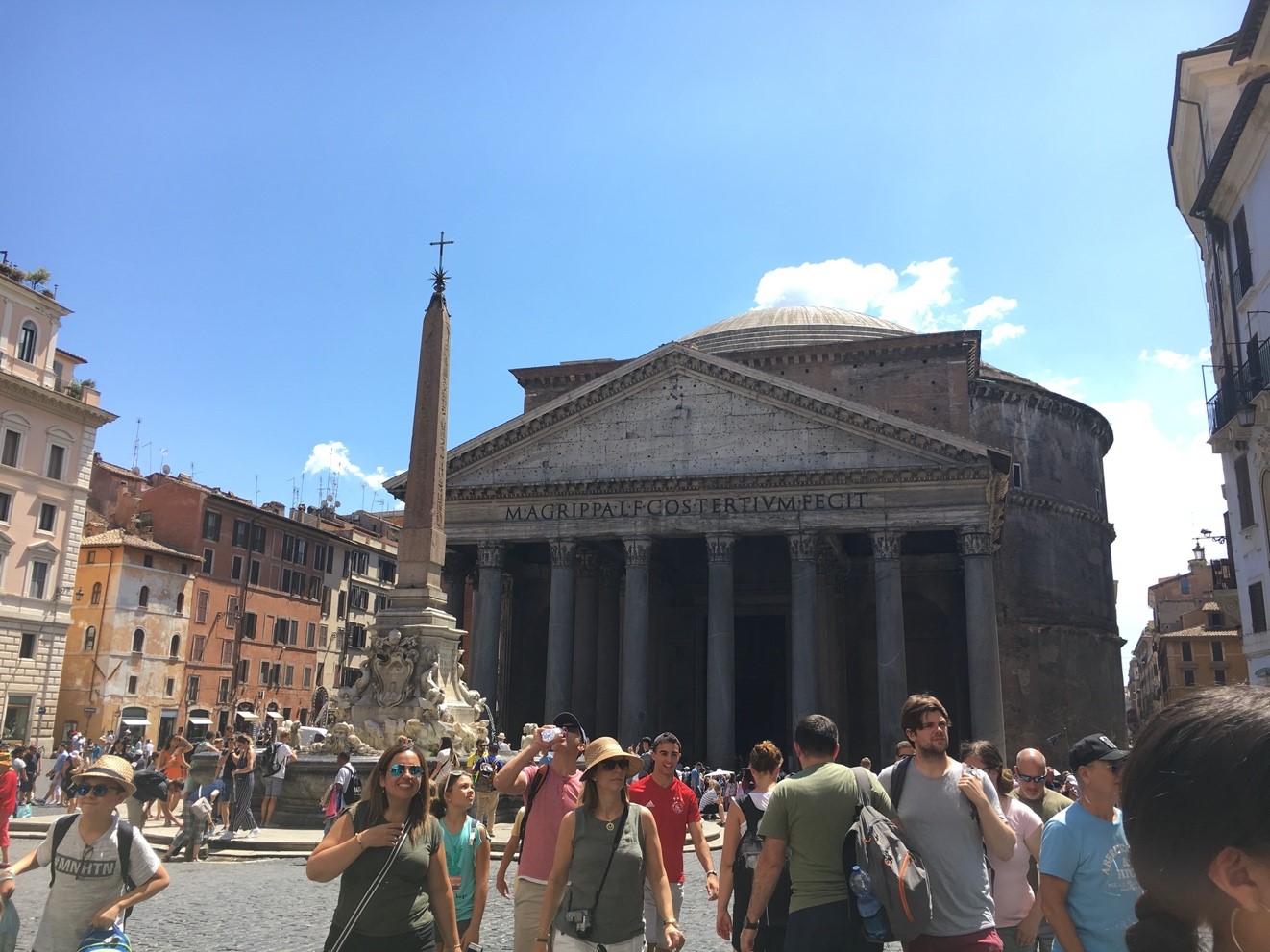
Pantheon
Italy, as a whole, was an amazing experience. I am someone who is often confined to a specific space and I like this space, I feel safe and nothing surprises me. But I pushed myself Way out of my comfort zone to take a 10-hour flight to a city where I can’t even speak the main language and I survived. I not only survived, but I absolutely loved being there. The classes were enjoyable, being able to walk the streets of Rome were amazing, seeing the Tibur River, drink some wine or beer with some Italian classmates I became friends with, it was all a thrilling experience. Even now, as it’s 20 degrees in Wisconsin, I can remember cooking under the Italian sun and I even weirdly miss the sunburn.
If possible, I highly encourage anyone to study abroad, or at least travel. I know that without this scholarship, it would’ve taken a lot more to manage to get out there. So, for that, I am incredibly grateful.
— Justice Hernday
A Summer in Bologna – Greek and Latin Summer School (2018)
By Cassidy Meyers
When life hands you $10,000, you must go to Italy. First, I must acknowledge the honor and privilege of receiving such a generous scholarship. It was an unreal experience reading the email from Dr. David Mulroy himself, announcing that I had been selected to receive the scholarship. Immediately shocked, as I had not even considered applying until I was urged to do so by several professors. Secondly delighted, as I realized I had just been handed the study abroad opportunity of a lifetime. It is not a common occurrence that a Classics department is endowed with such funding.
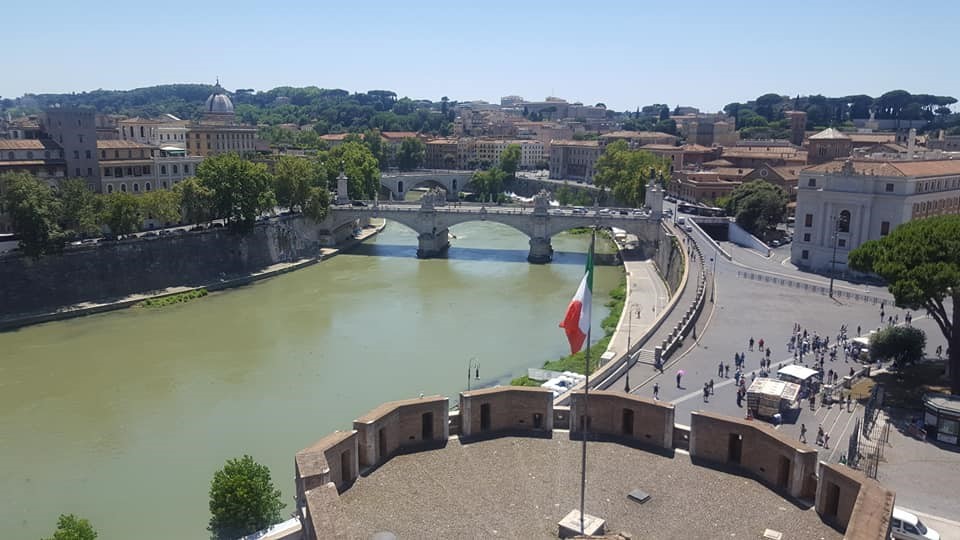
I was presented with many travel options, so long as the program was either in Greece and Italy and focused on the study of Classics. I had already been to Greece a few summers back and opted to travel to Italy. Professor Cova referred me to a program at her Alma Mater in Bologna. This program was not for the faint of heart: an intense, three-week program that immersed Greek, Latin and Ancient Culture into a nine-credit package. While there were many other programs that offered lighter workloads while still supplementing an enriched, educational experience, I thought the GLSS program would be most beneficial to not only my language studies, but to my academic resume as well.
The city of Bologna itself is stunning and great for students. It is easy to navigate, boasts the oldest university in the world and provides excellent food. I stayed in a hotel that was just a five-minute walk from the university, however there are plenty of dormitories around the city provided for students. They fill up quick though, so I had to book more expensive accommodations.
The first day of the program offered a practical and historic tour of Bologna, as well as an introduction of course expectations. The classes themselves were challenging: Latin began promptly at 9:00am, a one-hour break for lunch around 1:00pm, and Greek began at 2:00pm with the day ending around 6:00pm. A substantial amount of homework was given, which resulted in late hours studying at a café. This was the ‘double-duty’ intermediate course that I chose, and while the days were long and vigorous, the course proved to be extremely helpful in the end. I had not been enrolled in a Greek course in over two years and was surprised at how much of the grammar and vocabulary I was able to recall. Whether a student has zero to minimal knowledge or many years of the Greek and Latin languages, the program offers both beginner and intermediate courses. It was an enriching experience that certainly improved my language skills.
The GLSS program additionally offers an optional weekend trip to Rome (for a couple hundred Euro extra). I could not miss an opportunity to visit the Eternal City and so I went. Rome was a whirlwind of beauty, history and fantastic architecture. It is hard to experience all of Rome in just two days, but it was well worth the trip. In between my studies, I had one weekend to explore Italy on my own. I and a few other students took the train to Venice and had the day to tour the city. While Venice has a reputation for being full of tourists (which it was), the charming streets away from the noise stole my heart. We were fortunate enough to visit the Ducal Palace, housing the most elaborate and lavish wall and ceiling paintings I have seen.
I left Bologna with a reinforced knowledge of the Classical languages, a dash of modern Italian that I picked up while there, lifelong friends, and an unforgettable experience – all thanks to the generosity of the donor who founded the David Mulroy scholarship.
